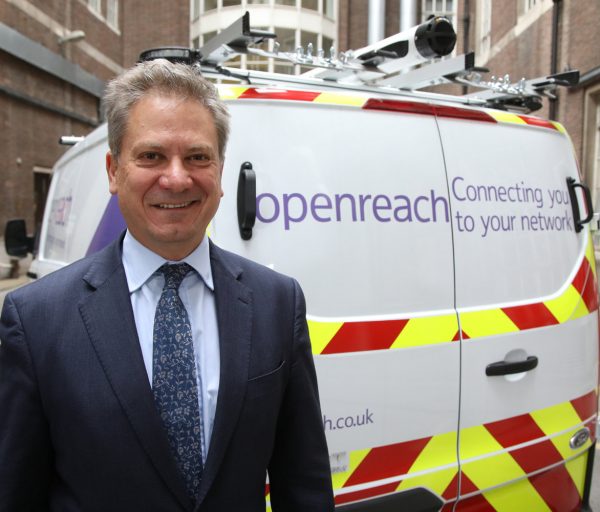Openreach CEO Appeals to UK Gov to Fix Planning, MDU Access and Permits UPDATE

The CEO of network access provider Openreach, Clive Selley, has today called on the new UK Government to help introduce “simple” fixes and reforms that would enable them to expand their gigabit-capable full fibre (FTTP) broadband ISP network into areas and properties that are still “missing out on upgrades” due to “red tape“.
Openreach have already extended their new Fibre-to-the-Premises (FTTP) network to cover 15 million premises (there are around 32.5m across the UK) and they aim to reach 25 million by December 2026. After that they have also expressed an ambition to reach “up to” 30 million by 2030.
However, the boss of the network access operator has today echoed earlier remarks from the CEO of BT Group, Allison Kirkby, who only a few short months ago highlighted that their ability to expand into some areas and particular properties was being obstructed (here).
Advertisement
Selley similarly warns that “out of date planning rules“, as well as restrictions on their ability to upgrade existing infrastructure inside large residential buildings (MDUs) and the permitting system for street works remain key challenges for their roll-out strategy that could mean “almost a million homes are still in danger of being left behind nationally“.
Clive Selley, Openreach CEO, said:
“Out of date planning rules mean owners must give express permission for upgrades – even when there’s an existing line in place. Sometimes finding landlords – let alone getting their agreement – is a major obstacle.
Already some 990,000 tenants are missing out on our Full Fibre network thanks to this red tape, but ministers have a chance to stop that at no extra cost to the taxpayer. With simple reforms to grant automatic upgrade rights. Ministers can prevent this new digital divide.
At the same time, everyone in the industry would welcome improvements to the local authority street works permitting system. Every year we apply for around 300,000 permits to carry out work on a street-by-street basis. But it’s no secret that the pandemic, global events and economic climate have left local authorities stretched, so it’s common to experience delays to permissions, which have a knock-on effect on broadband upgrades.
To achieve the stretching delivery targets set by Government, applications are likely to double over the next few years, placing a huge and unnecessary bureaucratic burden on everyone involved. A simple fix, at no cost to the taxpayer, would be to introduce flexible permitting – which allows builders to upgrade multiple streets at once.
It could even help deliver much-needed electric charging infrastructure as the country transitions from ICE to EVs.”
Naturally, solving some of these is not quite as easy as Selley makes it sound. For example, the issue of automatic upgrade rights in MDUs sounds fair and logical, but rivals warn that granting special access to Openreach – without also affording opponents a fair level of comparable accessibility – risks handing the incumbent an unfair competitive advantage (here).
The property owners will also have concerns that have to be balanced in all this (i.e. insurance, damage to property, security, safety (e.g. fire, asbestos) and other liabilities etc.), which is because upgrading copper lines to fibre in MDUs is often a bit more involved than it may seem (not minor work) and not everybody may want that. Suffice to say, network operators and the government will be walking a bit of a tightrope in terms of the rights of freeholders and leaseholders.
The second issue of street works permitting is, at least on the surface, much easier to resolve because flexi permits already have wide industry support within the utilities and telecoms sectors. This is where designated areas, rather than individual roads, can be combined into one permit for street works, which cuts time and reduces the costs.
Advertisement
However, the previous government were stalled on this and noted that flexi permits are not supported by everybody, with Highway Authorities often objecting to them. The HAs highlighted issues of rising administration costs, as well as difficulties with coordinating multiple works, overbooking of road space, and the potential loss of control/oversight of some works and practicality etc. In addition, not all utility firms have a good record and there was concern about the potential for this to get worse under flexi permits.
On the other hand, the new government have already set out their desire for more flexibility in the planning system via reform under the new Planning and Infrastructure Bill (here and here), which might make it easier to deploy new digital infrastructure. But it remains to be seen precisely how much of that will actually be of specific benefit to mobile and broadband operators that are seeking to expand and upgrade their networks.
Separately, in terms of mobile infrastructure, operators would still like to see it becoming easier and quicker to install higher masts to improve coverage (and thus also limiting / reducing the overall number of sites needed), together with greater freedoms to deploy smaller sites where greater capacity/infill is needed.
In any case, it will probably take a couple of years for this new bill to run the usual course of debates and studies before implementation, and a lot could happen in that time.
Advertisement
UPDATE 10:17am
The CCAO of London altnet Vorboss has given an alternative perspective.
Vorboss’ Chief Corporate Affairs Officer, James Fredrickson, said:
“Negotiating the delivery of new fibre has not held back rollout into MDUs for Openreach’s competitors – Openreach should compete on the same terms as its rivals, rather than seek to alter the law in its favour.
Ministers should not be fooled by Openreach’s ask regarding MDU access. Their evidence does not stack up. When reviewing gigabit connectivity rollout across Local Authorities, a higher proportion of MDU housing drives higher rates of gigabit connectivity coverage – and we have presented this analysis to ministers. This goes against the Openreach claim that MDUs are ‘in danger of becoming part of a new digital divide’. Rather, it suggests that continued national rollout will connect MDUs that are yet to be connected.
In truth, this is a monopoly, with Significant Market Power, seeking to leverage its legacy wayleave portfolio via primary legislation. This change could damage the competitive landscape that has driven the rollout of gigabit connectivity and deter future investment. It would also radically alter long-established principles of property law.
A genuinely level playing field in property access has allowed competition to flourish, and this one change could undermine that. Unintended consequences can be difficult to recover from.”
Mark is a professional technology writer, IT consultant and computer engineer from Dorset (England), he also founded ISPreview in 1999 and enjoys analysing the latest telecoms and broadband developments. Find me on X (Twitter), Mastodon, Facebook, BlueSky, Threads.net and Linkedin.
« Full Fibre Broadband ISP Zzoomm Tops 30,000 UK Customers






















































The government have received the notification and have marked a mail to the relevant team. It is currently awaiting allocation of a suitably skilled engineer. Please review back in 10 working days.
They need to fix the ordering process once an MDU has a Wayleave too, my MDU became available to order at end of March 2024 and I placed an order on the 2nd April. Come mid May the only updates I was getting was a weekly call saying they were waiting for a survey to happen. Things only got moving once I emailed the Openreach CEO and then everything was done, dusted and installed within 2 weeks.
It wasn’t the wayleave holding things up in this case (that was all sorted out prior) but Openreach’s own internal processes which delayed things.
I would say though the Lit Fibre has been in our street for around 18 months and they have expressed no interest in that time in trying to get into the MDU. Unless someone comes up with a way to share infrastructure within the MDU then surely Openreach makes the most sense if available as they are open to a wider range of ISPs. Otherwise we’ll have cables for all the different providers cluttering things up. As much as I would prefer the symmetrical speed Lit Fibre offer
Fun fact: there was something developed – but “due to the market conditions” the product is no longer in the market.
The telecoms market needs a major overhaul with competition and building safety
How is the street work permit scheme an issue when every other utility has to use the same scheme and none of them are crying out about it?
This reeks of ‘give us special treatment to save money’.
According to past government reports on this, other utility firms (not only telecoms) would like to see this too.
I worked for the local streetworks authority a couple of years back when they were looking into “flexi permits” and I can tell you that ALL the utilities wanted to see this happen!
Unfortunately for the local authorities it would make these works much harder to asses and manage, we could see the benefits of it for the utilities, but from our (authority) side, policing the works would be a nightmare!
Fredrickson – aka “rent a gob” – talks a good game, but he’s missing the point entirely, as usual. Yes, big housing blocks and fancy apartment buildings are straightforward and the altnets are doing a good job at upgrading them (albeit usually with an ethernet line into the basement rather than true fttp). But no altnet is upgrading small MDUs (i.e. 2-5 properties under one roof) in the suburbs at any scale at all. But of course he won’t be challenged on this…
This is an issue, I work for a local Altnet and we spent years trying to get access to council properties! No one would give us permission and we were passed from person to person! Once we eventually got assigned to someone willing to sign off the works it was then months of back and fourthing because they didn’t like this or didn’t like that and in one case we got “oh I can’t currently sign this as our printer isn’t working”…
And it went on like this for each housing authority! 4 years in total it took us to get permissions.
I’ve moved to a new rental property a month and a half ago and I cannot get Broadband. I don’t care if I get the old copper broadband any broadband would do. All providers are saying openreach is delaying the new installation of Fibre. EVERYONE IN MY BLOCK HAS BROADBAND BUT NOT US. THIS IS BECOMING VERY EXPENSIVE IN DATA AS MY CHILDREN NEED ACCESS TO DO THEIR WORK. CAN ANYONE HELP?
I experienced the exact same – no provider was (apparently) able to offer a copper connection because Openreach had ‘greyed out’ their option on the system. All said they can only sell me full fibre even though I stated clearly that fibre doesn’t come into the building.
Then I emailed the CEO and various Customer Service names in the Openreach organisation. Then I got a copper connection – it took two days for an engineer to be booked and said engineer took about 4 minutes to open the street cabinet and connect me. I am still trying to get to understand why I have had to jump through these hoops. Now have 74Mbps which is good enough for my needs.
And yet Hyperoptic, communityFibre, Vorboss and many others have all managed extensive MDU deployments. In truth this is asking the government for a monopoly, why shouldn’t BT have to negotiate with the asset manager like every single other ISP?
See the post from Alex above as this has already addressed your point.